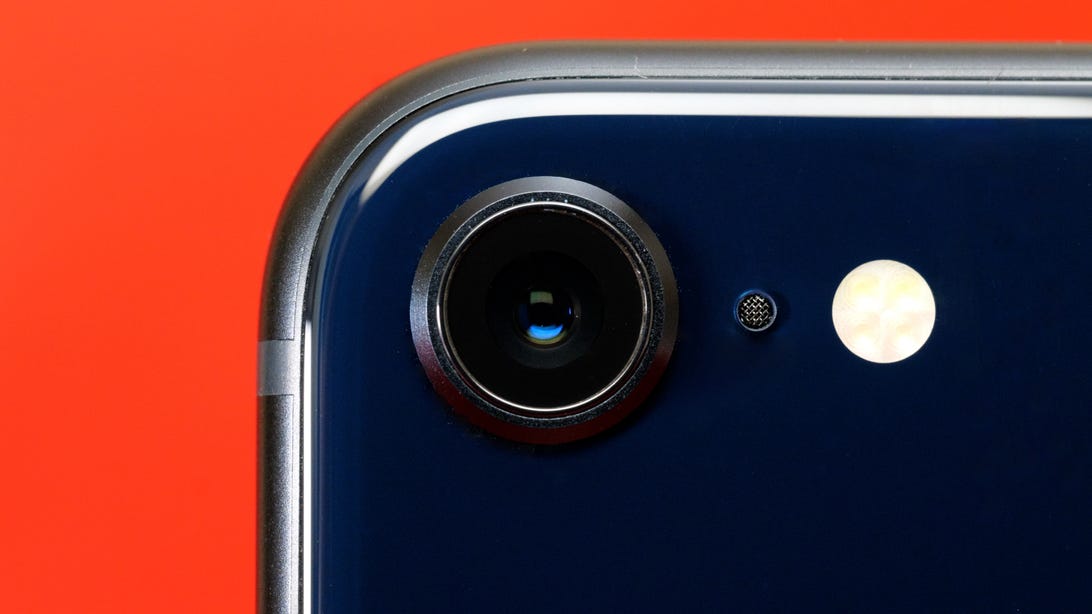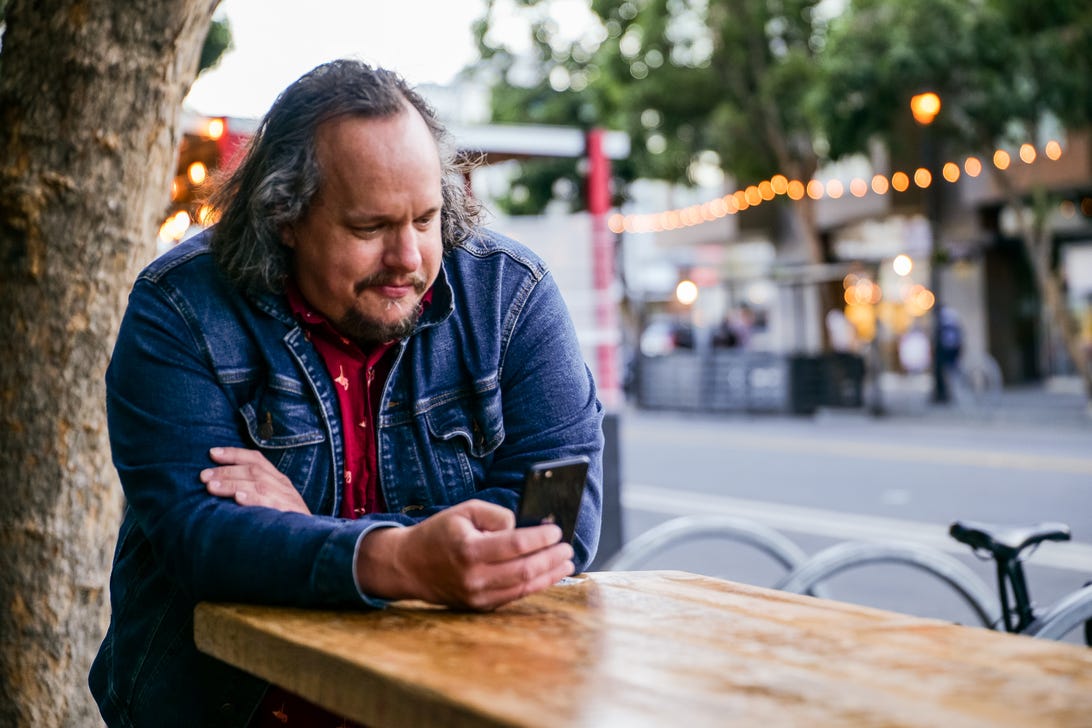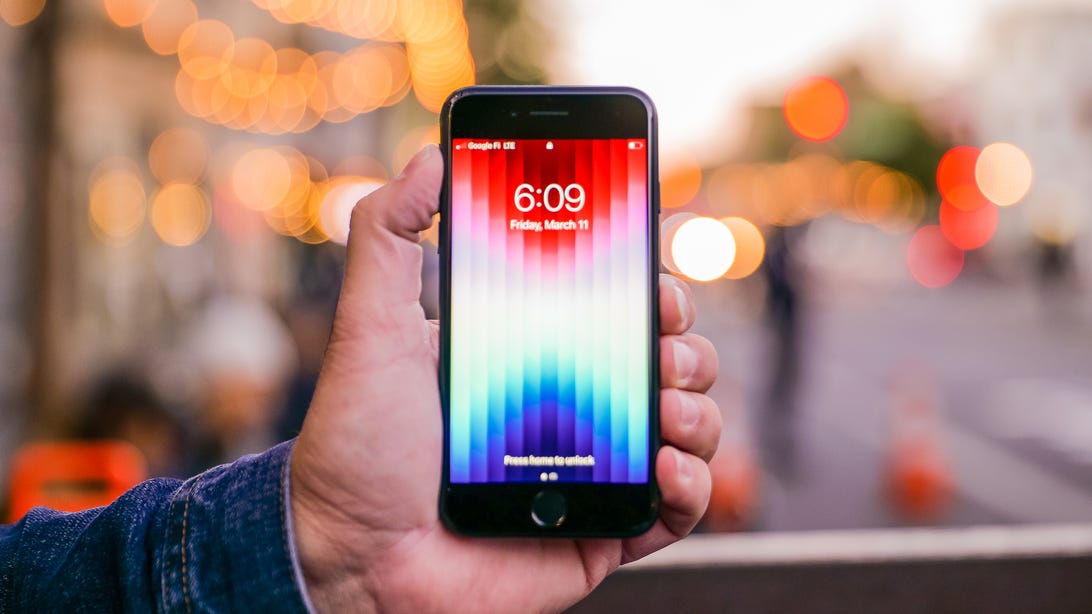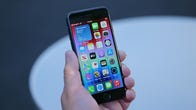
You’d be forgiven for confusing the new iPhone SE with the previous one. They look identical.
Kevin Heinz/CNET
At $429 (£419, AU$719), the iPhone SE (2022) is filled with an old-meets-new appeal. It’s a low-cost way for people to upgrade from an iPhone 8 (or older) who want to keep a familiar design. The new SE blends the body of an iPhone 8 with the tougher glass and processor from the iPhone 13, but it’s for those who don’t care about Face ID or MagSafe. Apple’s mix-and-match approach gives this iPhone newer features like 5G support, a longer battery life and iPhone 13-levels of performance, all while retaining the home button and the classic, user-friendly design. The iPhone SE is an extremely capable phone with a great camera and all the goodies like iMessage, FaceTime, Apple Music and access to the App Store.
Read more: 3 Upgrades Apple Gave the iPhone SE in 2022
The way Apple approached the SE reminds me of the car company Zelectric Motors, which takes vintage Volkswagen Beetles and replaces the old gas-powered engine with an electric motor. The VW bug becomes an entirely different car but at the same time retains the vintage appeal that people love. That’s exactly what’s going on with the SE. At $429, it has the design and body people are fond of, but in terms of apps and iOS features, it’s on par with iPhones that are nearly twice the price.
Like
- Affordable price
- Home button and Touch ID FTW
- Good battery life so far
- Camera takes good photos and videos
Don’t Like
- Lacks night mode for photos
- Screen could be brighter
- Bezels above and below screen look dated
- Selfie camera not on par with rear camera
- 20-watt USB-C charger not included
No other phone-maker takes this approach for a low-cost device. It would be like Samsung using the body of its Galaxy S8, putting the Galaxy S22’s processing power inside and charging people $400. The real question, however, is does this approach work? Hell yes, it does. I played graphic-heavy Apple Arcade games on the SE, filmed 4K videos and was able to use iOS 15 tools like Live Text capture with translation.
The iPhone SE is an incredible value for the price, especially compared to similarly priced Android phones like the Moto G Stylus 5G, Samsung Galaxy A42 5G and Google Pixel 5A with 5G. Any new phone under $500 is going to make compromises, and the SE demonstrates how savvy Apple was at omitting some things in order to keep others.
If you’re considering an iPhone SE, the $429 model comes with 64GB of storage. If you can stretch your budget $50 more, it’s worth upgrading to the 128GB version, especially if you plan to keep the SE for more than a couple years.
If you just want a small phone and are trying to choose between the iPhone SE and an iPhone 12 Mini, know that the Mini will cost $170 more. But for that extra money you get a larger and better screen, Face ID, two rear cameras, a contemporary design and a body that is smaller and lighter than the SE. Interestingly, the iPhone SE has a newer and faster processor, which could mean it gets iOS updates longer than the 12 Mini.
The iPhone SE’s home button delights
You’d be forgiven for mistaking the new SE with the previous one from 2020: They look identical. And while the letters SE stand for “Special Edition,” they could easily mean the “Same Edition.” That’s not a dig at either phone — the classic iPhone look is beloved by many. But keep in mind that in 2022, the SE’s design traces back to 2014’s iPhone 6 and is far from cutting-edge. Anyone looking for multiple rear cameras or minimal bezels won’t find them here.
The SE has large bezels above and below the screen and a home button with Touch ID instead of Face ID. If you are upgrading from an iPhone 6S, 7 or 8, this phone will seem nearly identical in terms of design and build. But it’s not. The SE has the same body as an iPhone 8, but the glass on the front and back is more durable. In fact, it’s the same glass used on the back of the iPhone 13. The finish on the review unit I tested is called midnight. In some lighting it looks jet black, and in other lighting it has an indigo hue.

The SE is the only iPhone you can buy new that has a home button and Touch ID.
Kevin Heinz/CNET
The new SE remains one of the smallest phones (Apple or Android) that you can buy. The glossy glass back and curved sides make the phone feel slippery. The body is rated IP67 for water and dust resistance, which means it can survive being submerged under a meter of water for 30 minutes. When filming the review video, I ran it under the faucet a couple of times to remove dust, and the SE still worked without a hitch.
After using Face ID-enabled iPhone models over the last several years, I was surprised by how much I enjoyed using Touch ID again. I hadn’t realized how much I missed it. It’s a joy to use Apple Pay by merely laying my thumb on my home button, compared to holding up a Face ID-enabled phone to my face to authenticate before paying with a card. At times, double-tapping the home button felt like a superior way to get into the app switcher. There are rumors that Apple might eventually bring back Touch ID with an under-display sensor like Samsung’s Galaxy phones and the Pixel 6 line, but until then the iPhone SE’s home button is the only iPhone still including it.
iPhone SE (2022): Apple’s Cheaper Phone Brings 5G to a Classic Design
See all photos
The iPhone SE’s 4.7-inch LCD could be brighter
At 4.7 inches, the SE has the smallest display on any iPhone. The screens on the 12 Mini and 13 Mini look big in comparison, even though the Mini phones are physically smaller than the SE overall. The SE’s screen feels cramped with the large forehead and chin space above and below the display. And for all intents and purposes, the SE has the same LCD that was on the 2020 iPhone SE and 2017 iPhone 8.
The SE’s screen has True Tone to adjust the color temperature of the screen depending on the lighting conditions. And colors look good on the SE. The amount of detail and contrast Apple is able to get out of this screen is impressive. Yet for a $429 phone, I wished the display would get brighter, especially in sunlight.

It’s amazing how much use Apple has gotten out of that 4.7-inch LCD display. It’s been on the iPhone 8, iPhone SE (2020) and now the new SE.
Kevin Heinz/CNET
If you’re coming from an older iPhone like a 7 or an 8, I don’t think these issues will be very noticeable. But switching between my iPhone 12 Mini to the SE, I missed having the Mini’s OLED screen. Keep in mind that the 12 Mini cost me $300 more than the SE when it was new (that was before discounts).
For a little bit more money, Android phones like the Google Pixel 5A with 5G or Samsung Galaxy A52 5G come with higher-resolution screens. But those phones sacrifice other features that the SE has, and don’t have access to most of Apple’s services. Again, making a phone affordable is all about making smart compromises.

The SE is the only iPhone Apple sells that has a single rear camera.
Kevin Heinz/CNET
The iPhone SE has a great camera and an average selfie camera
One of my biggest pet peeves for low-cost phones are the cameras. Many Android budget phones are notorious for including two or three cameras on the back of their phones even if they aren’t great. More is better right? Well, as I have said in previous reviews, I’d much rather have one good rear camera, or in the case of the iPhone SE, one great camera, rather than a bunch of mediocre ones.
The camera on the back of the SE has a 12-megapixel sensor and a wide angle lens with an aperture of f/1.8. These specs are identical to the camera on the iPhone 8 and 2020 SE. But that A15 Bionic chip changes how this phone captures photos and videos. It adds features like Smart HDR4 processing and Deep Fusion processing for medium-to-low light photos — plus, you can record 4K resolution, 60 fps (frames per second) video… on an iPhone SE! Just don’t expect Cinematic Mode from the iPhone 13 line or ProRes video from the 13 Pro to be here, because it’s not.
There are also Photographic Styles, which let you adjust the way your phone captures a scene so it’s more to your liking. These aren’t filters, but if you want your photos to have a warmer look or more vibrant colors, you simply change the style and that A15 chip does the rest to make it look its best.
Overall, photos taken in bright light and in medium lighting (like indoors at a restaurant) look good. In darker situations, photos from the SE look soft from the noise reduction. It’s a bummer that the SE doesn’t have a night mode. While other phones at the price of the SE or lower tend to include a night mode, most of them don’t work that well. The exception is the Google Pixel 5A with 5G, which technically costs $20 more than the SE.

In this photo of the Women’s Building in San Francisco, the SE did a good job capturing the colors and details.
Patrick Holland/CNET

In good lighting, the SE can capture accurate skin tones.
Patrick Holland/CNET

One interesting thing is how the iPhone SE keeps the shadows relatively dark.
Patrick Holland/CNET

This photo was taken just after sunset. The SE has Deep Fusion processing to help brighten photos without losing details.
Patrick Holland/CNET

The SE doesn’t have night mode, but it still did a decent job capturing this photo in a dark bar.
Patrick Holland/CNET

One of the biggest downsides to the SE’s camera is zoom. In this photo, I zoomed in all the way, The results weren’t great.
Patrick Holland/CNET
Below are some photos I took with the SE, as well as ones I took with my iPhone 12 Mini and a Google Pixel 5A with 5G. The Mini and 5A both have an additional rear camera for ultrawide photos, which the SE lacks.
Aside from color temperature, I was surprised how the SE had levels of contrast similar to the Pixel. In the photos above, the Pixel handles the highlights better (like in the sign).
The SE’s white balance was less consistent than the iPhone 12 Mini. I noticed the SE tends to keep shadows in its pictures darker than the 12 Mini. Take a look at the palm trees in the photos above. The 12 Mini’s photo is a little bit sharper, too.
On the front of the SE is a 7-megapixel selfie camera. It gets a boost from the A15 chip, too, but I can definitely see the limits. The dynamic range isn’t great.

This was taken just before sunset. The sky behind me was blue, but it shows up bright white in this selfie from the SE.
Patrick Holland/CNET

The iPhone SE has Portrait mode for selfies. And I like the way this one turned out.
Patrick Holland/CNET
iPhone SE (2022): See How Apple’s A15 Bionic Chip Transforms the Cameras
See all photos
The iPhone SE and its A15 Bionic Chip outperform the Galaxy S22 Ultra
Apple’s A15 Bionic chip is perhaps the biggest addition to the iPhone SE. It’s the same one in the iPhone 13 that outperforms any other phone currently sold. It’s also powering most of the software enhancements this phone has over the 2020 iPhone SE.
In use, the SE flies and iOS animations look smooth. The only times the phone got warm was when I played games for more than 20 minutes. But I never noticed the SE getting hot, not even when recording 4K 60fps videos.

The A15 Bionic transforms the SE from just a classic throwback into one of the most powerful phones you can buy today.
Kevin Heinz/CNET
In benchmark tests, the iPhone SE’s scores were right in line with those from the iPhone 13 and 13 Pro. The SE had better scores than any other phone we’ve tested, including the Samsung Galaxy S22 Ultra. The SE’s performance is even more impressive because only the most expensive Android phones have the best processors. Most low-cost Android phones have less powerful processors to help keep the costs down.
GEEKBENCH V.5.0 SINGLE-CORE
Note:
Longer bars indicate better performance
GEEKBENCH V.5.0 MULTICORE
Note:
Longer bars indicate better performance
The iPhone SE has a longer battery life
The iPhone SE now supports a 5G cellular connection — the more widely available but slower Sub-6 variety, though the SE will be able to connect to the faster C-band spectrum rolling out in the next several months. The SE does not support millimeter wave, but unless you live in specific locations like near a sports stadium in a major city, you likely don’t have mmWave coverage anyway. We have a few guides on CNET explaining C-band and comparing the iPhone SE’s 5G support against the $499, LTE-only iPhone 11. The short version is that this 2022 iPhone SE is set to support what will likely be how most people get that faster 5G network and speeds.
Unfortunately, my carrier doesn’t have 5G coverage where I tested the phone. But keep checking here because I’ll update this review with my experience using the SE on 5G once I can. That said, calls over 4G LTE were good and sounded clear.

The SE easily lasts a day on a single charge.
Kevin Heinz/CNET
On the inside, the SE has a larger battery, which — when combined with the new design, iOS 15 and the A15 Bionic chip — gives the phone a longer battery life than the previous iPhone SE. Over the four days I had the SE, it had no trouble making it through a day on a single charge. I often ended the day with the battery between 20% and 30%. The one day I shot a bunch of videos and took lots of photos, the SE’s battery ended up at 19%. My screen time has averaged five and a half hours a day.
Overall, while battery life seems improved, it is also somewhat average when compared to Android phones at the same price, which have batteries that can last two or three days on a single charge. I still have more battery tests to run and I’ll update my review with those results soon.
The iPhone SE supports Qi-wireless charging, but it doesn’t have MagSafe charging nor compatibility with MagSafe accessories. It also supports 20-watt wired fast charging but doesn’t come with the required power brick to take advantage of it.
For people upgrading to the SE from an iPhone 6S, 7 or 8, the lack of a charger is perplexing. People with older iPhone models likely have the old Apple 5-watt USB charger. The new SE comes with a Lightning to USB-C cable for fast charging but doesn’t come with a USB-C power brick — meaning a lot of people are probably never going to fast charge their new phone. Instead, they will likely continue using their old charger and cable to charge the new SE unless they pay $19 more to buy Apple’s 20-watt USB-C power brick. There are other USB-C power bricks that work with the iPhone SE, but it’s an extra expense to consider for anyone that doesn’t have one and would like faster charging speeds.

The new SE is a capable iPhone and the most affordable way to get into everything Apple.
Kevin Heinz/CNET
The iPhone SE is the affordable way to get into Apple
As was the case in 2016 and 2020, the iPhone SE is your cheapest admission ticket to Apple’s ecosystem: iCloud, iMessage, App Store, Apple TV Plus, Apple Music, FaceTime. At $429, I think it’s worth the price and is an incredible value for what you get.
I wish that Apple had kept the 2020 iPhone SE in its roster as an even cheaper way to get an iPhone, but this new iPhone SE still packs lots of modern features and will likely get more from iOS updates in years to come.
Apple iPhone SE (2022) specs vs. Apple iPhone 12 Mini, Google Pixel 5A with 5G, Motorola Moto G Stylus 5G
| Apple iPhone SE (2022) | Apple iPhone 12 Mini | Google Pixel 5A with 5G | Motorola Moto G Stylus 5G | |
|---|---|---|---|---|
| Display size, resolution | 4.7-inch LCD; 1,334×750 pixels | 5.4-inch OLED; 2,340×1,080 pixels | 6.34-inch OLED; 2,400×1,080 pixels | 6.8-inch LCD; 2,400×1,080 pixels |
| Pixel density | 326ppi | 476ppi | 413ppi | 386ppi |
| Dimensions (Inches) | 5.45 x 2.65 x 0.29 in | 5.18 x 2.53 x 0.29 in | 6.1 x 2.9 x 0.3 in | 6.67 x 3.05 x 0.39 in |
| Dimensions (Millimeters) | 138.4 x 67.3 x 7.3 mm | 131.5 x 64.2 x 7.4 mm | 156.2 x 73.2 x 8.8 mm | 169.54 x 77.48 x 9.35 mm |
| Weight (Ounces, Grams) | 5.09 oz; 144 g | 4.76 oz; 135 g | 6.45 oz; 183 g | 7.67 oz; 217.5 g |
| Mobile software | iOS 15 | iOS 14 | Android 11 | Android 11 |
| Camera | 12-megapixel | 12-megapixel (wide), 12-megapixel (ultrawide) | 16-megapixel (ultrawide), 12-megapixel (wide) | 48-megapixel (wide-angle), 5-megapixel (macro), 8-megapixel (ultrawide angle), 2-megapixel (depth sensor) |
| Front-facing camera | 7-megapixel | 12-megapixel | 8-megapixel | 16-megapixel |
| Video capture | 4K | 4K | 4K | 4K |
| Processor | Apple A15 Bionic | Apple A14 Bionic | Qualcomm Snapdragon 765G | Qualcomm Snapdragon 480 5G |
| Storage | 64GB, 128GB, 256GB | 64GB, 128GB, 256GB | 128GB | 256GB |
| RAM | Undisclosed | Undisclosed | 6GB | 6GB |
| Expandable storage | No | No | No | Up to 1TB |
| Battery | Undisclosed; Apple lists 15 hours of video playback | Undisclosed; Apple lists 15 hours of video playback | 4,680 mAh | 5,000 mAh |
| Fingerprint sensor | Yes | No (FaceID) | Back | Back |
| Connector | No | Lightning | USB-C | USB-C |
| Headphone jack | No | No | Yes | Yes |
| Special features | 5G; water resistant (IP67); dual-SIM capabilities (nano-SIM and e-SIM); wireless charging | 5G; MagSafe; water resistant (IP68); wireless charging; dual-SIM capabilities (nano-SIM and e-SIM) | 5G; Titan M chipset (security chip); dual-pixel main camera; IP67 water rating; dual SIM; stereo speakers; 18W fast charging | 5G; Stylus, 10W charging; Thinkshield Mobile security; spot color selection for photos and videos; dual-capture video simultaneously with front and rear cameras |
| Price off-contract (USD) | $429 (64GB), $479 (128GB), $579 (256GB) | $729 (64GB), $779 (128GB), $879 (256GB) | $449 | $400 |
| Price (GBP) | £419 (64GB), £469 (128GB), £569 (256GB) | £699 (64GB), £749 (128GB), £849 (256GB) | N/A, but converts to £345 | N/A, but converts to £285 |
| Price (AUD) | AU$749 (64GB), AU$829 (128GB), AU$999 (256GB) | AU$1,199 (64GB), AU$1,279 (128GB), AU$1,449 (256GB) | N/A, but converts to AU$620 | N/A, but converts to AU$515 |

